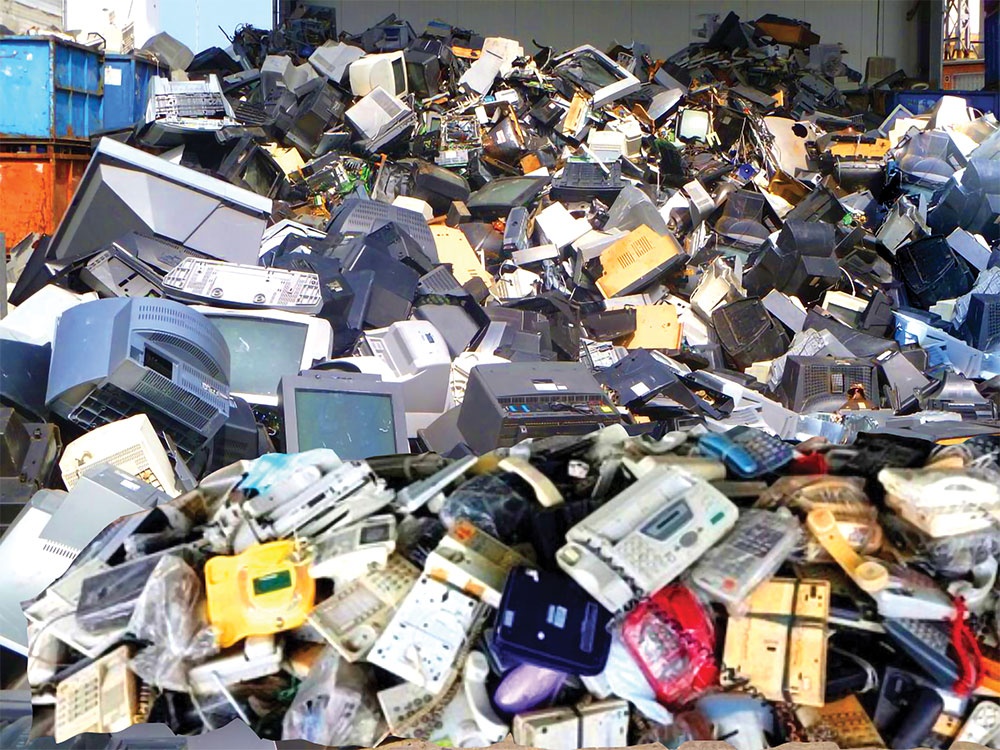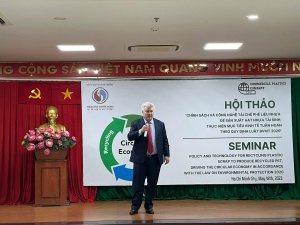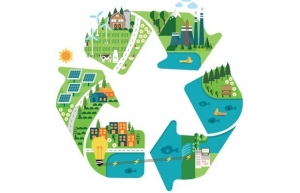E-waste recycling costs unsettle FIEs
A number of businesses and industry associations last week shared their feedback on the draft decision regarding recycling costs determination proposed by the Ministry of Natural Resources and Environment (MoNRE) at a workshop on extended producer responsibility (EPR) on e-waste in Hanoi.
 |
| E-waste recycling costs unsettle FIEs |
The proposed decision outlines a reasonable and valid recycling costs norm for a unit volume of products and packages (Fs), administrative cost of management, supervision, and support to perform the waste collection and recycling responsibilities of manufacturers and importers.
According to the draft decision, manufacturers and importers of products like batteries, accumulators, tyres, lubricants, and packages for food, cosmetics, drugs, fertilisers, animal feed, detergents, and commercial cement will be responsible for recycling costs starting from January 2024. Electrical and electronic products will be included from 2025 and vehicle products from 2027.
Manufacturers can either recycle themselves or contribute financially to Vietnam’s Environmental Protection Fund to support recycling efforts.
The decision is built in the context the Law on Environmental Protection 2020 and Decree No.08/2022/ND-CP dated January 10, 2022 require manufacturers and importers of certain products and packages to take responsibility for recycling and treatment based on mandatory recycling rates and specifications.
In general, the amount of e-waste in Vietnam is increasing rapidly and diversify in types. These products remain a valuable source, but proper recycling and appropriate recycling infrastructure are lacking, businesses said.
Besides that, e-waste is mostly collected, dismantled, sorted, and also recycled mainly by the small- and medium-sized private informal sector.
Ineffective processes
There are around 70 formal companies licensed to handle waste and electronic components nationwide with a capacity of under 30 tonnes a day, most of which focus on manual dismantling and dismantling, of which only a few small companies have full processing lines to be licensed to handle electronic circuit boards and electronic elements.
Nguyen Duc Quang, deputy director of the Institute of Environmental Science and Technology said, “Currently, only medium- and large-sized electronic devices are easily dismantled and recycled in Vietnam. Small devices are of little interest because of low material recovery and low recycling efficiency. Current technologies in licensed hazardous waste facilities are mainly for the treatment of electronic circuit boards, a component containing high-value metals, but in small quantities.”
Many technologies are suitable for hazardous waste treatment, but not effective for recycling, for example, solidification of fluorescent lamp glass, lead-containing glass, incineration in industrial solid waste incinerators, Quang added. “Some products have not been recycled in Vietnam, such as photovoltaic panels. From this fact base, Fs is calculated for the group of electrical-electronic products which are mainly determined as the stages of manually dismantling, scrap classification, and recycling of base metals,” he said.
Thus, the introduction of EPR is expected to encourage the establishment and development of collection and recycling infrastructure in the country, even though this process will take time to yield visible results. While the draft decision has for the first time provided a list of waste products and packaging with norms of recycling costs for each product group, it has formalised the adjustment factor, an important component in the rational calculation of the recycling cost norm.
Dr. Bernd Kopacek, an expert from the International Finance Corporation, said that the recycling cost norms for electrical and electronic devices primarily focus on dismantling and recycling iron, aluminium, copper, and glass, while ignoring the recycling of other parts and the treatment of hazardous substances.
He emphasised the need to consider the costs of treating hazardous substances and the revenues from precious metals. “The current approach would make it difficult for the formal sector to compete with informal collectors who pay for scrap,” Kopacek said.
Many associations also pointed out an unreasonable point in the draft decision. In late May, 14 business associations, including the Vietnam Automobile Manufacturers Association, the Vietnam Plastics Association, and the Vietnam Association of Pesticides Manufacturing and Trading Enterprises, submitted proposals to the MoNRE, requesting a reduction in recycling costs.
They argued that the Fs is based on insufficient data and does not consider the value of recovered products in line with the principles of the circular economy.
Encouraging participation
The norm of recycling costs in the draft is also many times higher than the countries’ average level, with the associations concerned that the construction of high norms can lead to the risk of causing price increases for many products and goods on the market, making it difficult for workers in the industry and consumers.
At the workshop organised by the MoNRE last week, some concerns were raised that the recycling costs in Vietnam are at least double or even up to eight times higher than those in South Korea, India, the United Kingdom, Germany, and Spain. It also includes the business recycling sector.
If the companies charge this cost, they say, product prices will be higher, and they have yet to have the infrastructure for recycling. They said that they need to have a reasonable price in collaboration with some incentives to encourage recycling facilities to make investments in recycling work. However, if the prices are set too high, then it is unprofitable and fails to encourage manufacturers themselves to recycle their products.
According to the representative of one company at the workshop, because of the current recycling system in Vietnam, they just temporarily dismantle items before collecting and transporting them to the recycling facilities.
“If you separate them, the costs will be cheaper than the proposal. We encourage enterprises to take on recycling work, but we also recommend that they take on the treatment and recycling of hazardous waste,” said the representative.
According to the draft decision on recycling costs, different electrical and electronic products have different Fs rates based on the recycling technology used, the amount of recovered material, and the value of the material. Efficiently recycled products will have lower Fs, while products that have not been effectively recycled in Vietnam will have a higher rate.
Notably, the financial contribution and funding support for recycling discarded products and packaging is determined by volume for the group of electrical and electronic products.
Manufacturers are concerned that these rates will add pressure. A representative of a foreign appliance maker said that the group is aware of the importance of collecting and recycling the e-waste and that manufacturers can either recycle themselves or contribute financially to Vietnam’s Environmental Protection Fund to support recycling efforts. Her company prefers the self-recycling plans.
“However, we see that with the company’s current conditions, it is extremely difficult for us to establish a network from the manufacturing facilities to distributors and customers to collect the e-waste,” she said. “At present, the manufacturers have to be proactive in collecting it, thus the company is considering the plan to pay the fee.”
According to her, the problem is that the current offered Fs norms will put more pressure on the company. The company’s key products are washing machines and fridges, with an Fs of VND8,240 (35 US cents) per kg for a washing machine and just slightly more for a fridge. “Based on the current Fs of around $22 per unit for these products, which account for about 5-7 per cent of the product prices, we have to pay millions of US dollars for this annually,” she said.
| Nguyen Thi Vui - Project manager, Phu Thai Cat Phu Thai sees the business opportunities to join in the recycling industry from the extended producer responsibility (EPR) policy. I think that the application of EPR will be a tool to force manufacturers to take responsibility for their products after being sold, thus creating a stable source of waste for recycling. This policy is useful for recycling facilities because to become a professional facility, they depend on the collection system. Meanwhile, the current facilities have to collect e-waste from unofficial sources. Our company has carefully studied the EPR mechanism, especially the application of Fs on e-waste. Based on the trajectory of a company that has a plan to join the recycling industry, we think that the current offered Fs norms on e-waste are not reasonable. Manufacturers can either recycle themselves or contribute financially to the fund to support recycling efforts. However, the current costs will put pressure on manufacturers. We also propose that policymakers should add a specific schedule for adjusting the Fs and clarify the basis for these adjustments. |
 | Seminar held on recycling plastic waste Responding to World Environment Day 2023, the Centre of Natural Resources and Environment Communications, under the Ministry of Natural Resources and Environment, held a seminar on May 18 on policy and technology for recycling plastic scrap to produce recycled PET, while driving the circular economy. |
 | Thailand promotes food waste disposal initiatives The Thai Organic Consumer Association (TOCA) is working with hotels in Phuket to initiate a food waste composting system, which is in line with the government’s Bio-Circular-Green Economic Model (BCG), in an effort to reduce increasing food waste in the context of tourism recovery in Thailand. |
What the stars mean:
★ Poor ★ ★ Promising ★★★ Good ★★★★ Very good ★★★★★ Exceptional
 Tag:
Tag:
Related Contents
Latest News
More News
- Ho Chi Minh City launches plan for innovation and digital transformation (February 25, 2026 | 09:00)
- Vietnam sets ambitious dairy growth targets (February 24, 2026 | 18:00)
- Masan Consumer names new deputy CEO to drive foods and beverages growth (February 23, 2026 | 20:52)
- Myriad risks ahead, but ones Vietnam can confront (February 20, 2026 | 15:02)
- Vietnam making the leap into AI and semiconductors (February 20, 2026 | 09:37)
- Funding must be activated for semiconductor success (February 20, 2026 | 09:20)
- Resilience as new benchmark for smarter infrastructure (February 19, 2026 | 20:35)
- A golden time to shine within ASEAN (February 19, 2026 | 20:22)
- Vietnam’s pivotal year for advancing sustainability (February 19, 2026 | 08:44)
- Strengthening the core role of industry and trade (February 19, 2026 | 08:35)





















 Mobile Version
Mobile Version